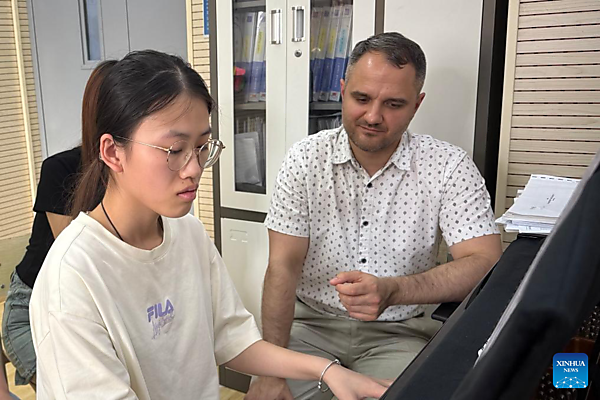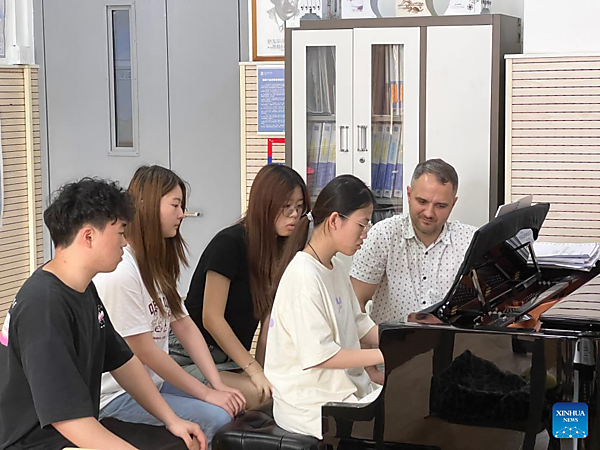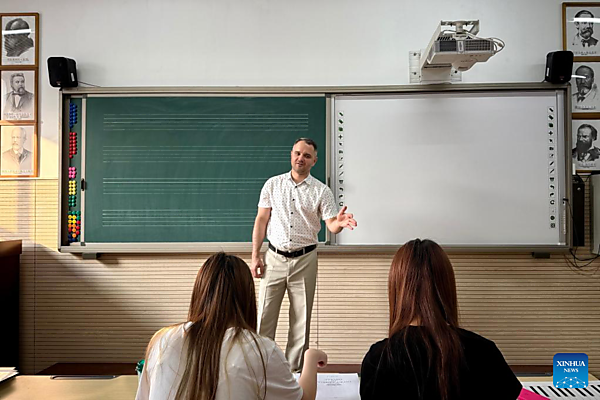 |
| Ostapenko Anton Gennadievich (R) instructs his students to play the piano in Harbin, northeast China's Heilongjiang Province, June 18, 2025. [Xinhua/Yang Siqi] |
HARBIN, July 17 (Xinhua) — At Harbin Conservatory of Music, Russian musicologist Ostapenko Anton Gennadievich joined students in singing, blending his voice with theirs as his fingers danced across the piano keys.
"I really enjoy Anton's solfeggio sessions as he teaches us to hum melodies while playing the piano. This has greatly improved our musicality," said Wang Siyuan, a freshman majoring in composition, adding that the course is especially popular among her peers.
Gennadievich, a research fellow at the St. Petersburg State Conservatory, came to Harbin, capital of northeast China's Heilongjiang Province and a city with deep historical ties to Russia, in 2016 through an institutional exchange program.
"My doctoral research topics include Russian musicians in China, so I was already interested in the development of classical music here for years," he said, citing Harbin's vibrant classical music culture that drew him.
"The Harbin Summer Music Concert is one of the longest-running music events in China, and my favorite symphony orchestra, the Mariinsky Theatre Symphony Orchestra, has also performed at the Harbin Grand Theatre, making me yearn to visit this 'city of music,'" he said.
The "city of music" has certainly matched his expectations. Harbin Conservatory of Music, where he teaches, has hosted numerous international music competitions and played a leading role in establishing the China-Russia Music Alliance with the St. Petersburg State Conservatory in 2023.
Teachers and students from this Chinese conservatory have also performed at prestigious artistic venues such as China's National Center for the Performing Arts and the Winter Palace in St. Petersburg.
During his tenure in Harbin, Gennadievich has been struck by Chinese composers' works, particularly their expressive vitality and cultural charm.
"The powerful Yellow River Cantata by Xian Xinghai is one of the works that best represent the essence of Chinese classical music. Works like Er Huang and Iris Unveiled by composer Chen Qigang, which embody a sense of serenity and contemplation, are also full of charm, resonating with French classical music," Gennadievich said.
For him, music serves as a universal language and cultural conduit. "To understand a nation's music, you naturally learn about its culture. This is why exchanges between musical traditions and musicians can often create conditions for cultural understanding," he explained.
Gennadievich said that at least 50 Russian musicians now reside and work across China, contributing to the flourishing of classical music in the country.
"I teach at Harbin Conservatory of Music for over eight months each year and have mentored more than 300 students so far. Many of them have shown great talent in classical music, and I am confident they will make their mark in the future," he said. The growing presence of talented Chinese musicians at Moscow's Rachmaninoff International Competition has strengthened his confidence in the future οf classical music in China.
Looking ahead, Gennadievich hopes to deepen East-West musical dialogue by leveraging Harbin's unique geographic and historical advantages. He has proposed expanding the Summer Music Concert and international competitions, training specialized music translators, and launching multinational exchange initiatives.
"Musicians are bridges for cultural exchange," he said. "It's an honor to contribute here."
 |
| Ostapenko Anton Gennadievich (R) instructs his students to play the piano in Harbin, northeast China's Heilongjiang Province, June 18, 2025. [Xinhua/Yang Xuan] |
 |
| Ostapenko Anton Gennadievich teaches his students at Harbin Conservatory of Music in Harbin, northeast China's Heilongjiang Province, June 18, 2025. [Xinhua/Yang Siqi] |
(Source: Xinhua)
Editor: Wang Shasha